Articles

Gratitude
PowerPoint Slides from Deborah Bircham from Live Well with Chronic Illness webinar 'Gratitude' exploring what is Gratitude, and how can it help us.
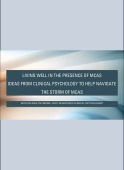
Navigating the Storm
PowerPoint Slides from Dr. Ashlyn Firkins webinar 'Navigating the Storm'. You can find the recording of this session on our YouTube channel.
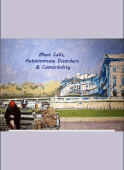
Understanding Mast Cells, Autoimmune Disorders and Comorbidity
PowerPoint slides from Roselle O'Brien's talk 'Understanding Mast Cells, Autoimmune Disorders and Comorbidities'. You can find the recording of this session on our YouTube channel.
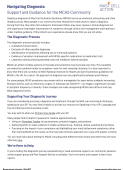
Navigating Diagnosis: Support and Guidance for the MCAS Community
This guide is designed to support individuals in the MCAS community who are navigating the challenges of seeking a diagnosis.
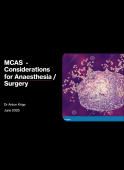
MCAS and Related Conditions - Special Consideration for Anaesthesia Surgery with Dr. Anton Krige
PowerPoint slides from our Dr Anton Krige's webinar 'MCAS and Related Conditions - Special Consideration for Anaesthesia Surgery with Dr. Anton Krige'. You can find the recording of this session on our YouTube channel.
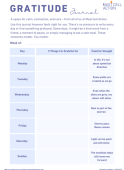
Gratitude Handout
Use this journal however feels right for you. There’s no pressure to write every day or find something profound. Some days, it might be a kind word from a friend, a moment of peace, or simply managing to eat a safe meal. These moments matter. You matter.
Potato lectin activates basophils and mast cells of atopic subjects by its interaction with core chitobiose of cell-bound non-specific immunoglobulin E
S. N. Pramod, Y. P. Venkatesh and P. A. Mahesh (2007). This study addresses the role of potato lectin (STA) in activating mast cells and basophils through non-specific binding to IgE and FcεR receptors. It studies the effect of STA on atopic and non-atopic subjects, and finds that it may cause non-allergic hypersensitivity in some atopic individuals, despite not being a ‘true allergen’. Therefore, it suggests that lectins in foods like potatoes and tomatoes may contribute to symptoms of allergic reactions (e.g. asthma) in STA-sensitive individuals.

Retrain Your Brain, Retrain Your Mast Cells
PowerPoint slides from Roselle O'Brien's webinar 'Retrain Your Brain, Retrain Your Mast Cells'. You can find the recording of this session on our YouTube channel.
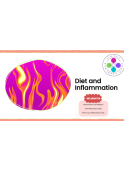
Foods and Inflammation
PowerPoint slides from Deborah Bircham's from Live Well with Chronic Illness webinar 'Foods and Infammation'. You can find the recording of this session on our YouTube channel.
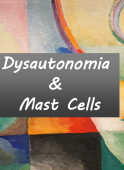
Dysautonomia
PowerPoint slides from Roselle O Brien's webinar 'Dysautonomia'. You can find the recording of this session on our YouTube channel.

Your Safe Haven at Home
PowerPoint slides from Roselle O Brien's webinar on 'Your Safe Haven at Home'. You can find the recording of this session on our YouTube channel.

MCAS and Environmental Pollution the Toxic Truth
PowerPoint slides from Deborah Bircham's from Live Well with Chronic Illness' webinar 'MCAS and Environmental Pollution the Toxic Truth'. You can find the recording of this session on our YouTube channel.

What is detoxing and how might it help with MCAS?
PowerPoint slides from Deborah Bircham's from Live Well with Chronic Illness' webinar on 'What is detoxing and how might it help with MCAS?'. You can find the recording of this session on our YouTube channel.
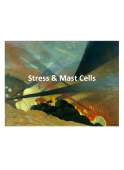
Stress and Mast Cells
PowerPoint slides from Roselle O Brien's webinar on 'Stress and Mast Cells'. You can find the recording of this session on our YouTube channel.

Pillars of Health
PowerPoint slides from Deborah Bircham's from Live Well with Chronic Illness's webinar 'Pillars of Health'.
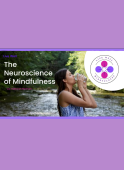
The Neuroscience of Mindfulness
PowerPoint slides from Deborah Bircham's from Live well with Chronic Illness's webinar 'The Neuroscience of Mindfulness', You can find the recording of this session on our YouTube channel.
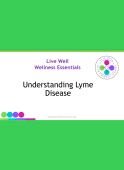
Understanding Lyme Disease – a general introduction to Lyme
PowerPoint slides from Deborah Bircham from Live well with Chronic Illness's webinar 'Understanding Lyme Disease – a general introduction to Lyme'. You can find the recording of this session on our YouTube channel.

How to Fight On in Tough Times – Tools and Tips to Foster Mental Resilience
PowerPoint slides from Deborah Bircham's from Live Well with Chronic Illness' webinar 'How to Fight On in Tough Times – Tools and Tips to Foster Mental Resilience'. You can find the recording of this session on our YouTube channel.

How to be Heard: Advocating for yourself within the NHS
PowerPoint slides from Vicky Pearson's webinar 'How to be Heard: Advocating for yourself within the NHS'. You can find the recording of this session on our YouTube channel.

How to Sleep Well
PowerPoint slides from Deborah Bircham's from Live Well with Chronic Illness webinar 'How to Sleep Well'. You can find the recording of this session on our YouTube channel.
Become a friend
Sign up to become a Friend of Mast Cell Action so we can keep you up to date on our progress and on how to get involved in our latest campaigns and initiatives.
Donate
Mast Cell Action relies entirely on the generosity of people like you. Please make a donation now and together we can make a difference to those affected by MCAS.







